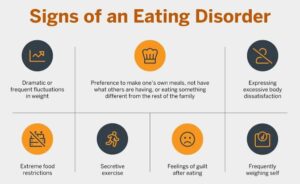Eating Disorder and Nutritional Management
Eating disorder is a serious mental health conditions which affect a person’s eating habits, body weight, and overall health and well-being in terms of emotions and thoughts about food, body image and weight. There are different types of eating disorders and these include anorexia nervosa, bulimia nervosa, and binge eating disorder.
People with anorexia nervosa often restrict food intake, due to a distorted body image and an intense fear of gaining weight. They may see themselves as overweight or obese even when they are underweight. Bulimia nervosa is associated with cycles of binge eating followed by behaviors to compensate for overeating, such as self-induced vomiting, excessive exercise, or fasting. It can also lead to serious health issues if proper intervention is not done. Binge eating disorder involves recurrent episodes of eating large quantities of food in a short period and feeling a lack of control during these episodes. This is different from bulimia where there is no compensatory behavior after binge eating.

Eating disorder can cause several problems for an individual like distorted body image, obsessive thoughts about food and weight, restrictive eating patterns, purging, excessive exercise or weight control measure, social withdrawal and secrecy around eating. Nutrition plays a very important role in the managing and treatment of eating disorders. Most times a balanced and individualized meal plan is often a key component of recovery. Also there are a few control measures that cab be carried out in maintaining a good eating lifestyle;
- Balancing of meal plans : An individualized meal plan is taken into consideration by a dietician or nutritionist. An individual with eating disorder must adhere strictly to this plan and work hand on hand with the dietitian. This meal is to support mental and physical health of the individual.
- Nutritional Education : Providing education on nutrition helps individuals understand the importance of how food nourish the body and the impact of food choices on their overall health and well-being.
- Conscious eating : Individuals are encouraged to be conscious of their eating practices. Also paying attention to hunger and fullness cues, savoring food, and being present during meals, this can help individuals develop a healthier relationship with food and their bodies.
- Nutritionists and healthcare providers should also offer emotional support and guidance to help individuals battling with eating disorder navigate the emotional aspects of eating disorders.
Read more on : DIABETIC RETINOPATHY [DR]
Nutritional management of Cataracts





Leave a Reply